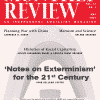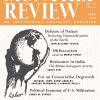
The Jakarta Method, Then and Now: U.S. Counterinsurgency and the Third World
Increasing numbers of left-wing activists around the world are turning to Vincent Bevins’s The Jakarta Method to learn more about the horrific atrocities committed by the United States against peoples’ struggles for the right to self-determination in the so-called postcolonial era. In particular, the book describes how imperialist expansion destroyed revolutionary struggles in the third world. | more…

May 2022 (Volume 74, Number 1)
To get a firm grasp on the current situation in Ukraine, we must understand the central role that the United States and NATO have played in the conflict from the start, beginning in 2014 with the U.S.-engineered Maidan coup. | more…

“Notes on Exterminism” for the Twenty-First-Century Ecology and Peace Movements
In 1980, the great English historian and Marxist theorist E. P. Thompson wrote the pathbreaking essay “Notes on Exterminism, the Last Stage of Civilization.” Although the world has undergone a number of significant changes since, Thompson’s essay remains a useful starting point in approaching the central contradictions of our times, characterized by the planetary ecological crisis, COVID-19 pandemic, New Cold War, and current “empire of chaos”—all arising from features deeply embedded in the contemporary capitalist political economy. | more…
Giving War a Chance
The Council on Foreign Relations (CFR) is the ultimate agenda-setting, strategic planning, and consensus-forming organization of the U.S. capitalist ruling class. The latest book to come out of the CFR orbit, Strategy of Denial (2021), thus provides an opportunity to concretely observe how the monopoly capitalist ruling class is preparing the people of the United States for what could be a catastrophic world war. | more…

Marxism, Science, and Science Studies
The history of Marxism in relation to science is extraordinarily dense and dramatic. Although it is a fascinating and important story, it is one increasingly forgotten. | more…

Africa Is on the Move
In 1975, Walter Rodney said, Africa is on the move. This line stays with me, digs deep into my sense of historical possibility. What did Rodney mean when he said that line? | more…

Histories of Racial Capitalism and the Dynamics of the Capitalist System
The term racial capitalism is a bit of a shibboleth. Those who invoke the phrase draw from a longstanding tradition of radical scholarship that brings attention to the material force of racialism in systems of capitalist domination. There is, however, a mounting critique that questions the term’s usefulness, casting doubt on the scholarly project initiated by Cedric Robinson. In the face of such concerns, Histories of Racial Capitalism is a much needed contribution. | more…

April 2022 (Volume 73, Number 11)
As we write these notes at the beginning of March 2022, the eight-year limited civil war in Ukraine has turned into a full-scale war. This represents a turning point in the New Cold War and a great human tragedy. By threatening global nuclear holocaust, these events are also now endangering the entire world. To understand the origins of the New Cold War and the onset of the current Russian entry into the Ukrainian civil war, it is necessary to go back to decisions associated with the creation of the New World Order made in Washington when the previous Cold War ended in 1991. | more…

The Defense of Nature: Resisting the Financializaton of the Earth
The rapid financialization of nature is promoting a Great Expropriation of the global commons and the dispossession of humanity on an unprecedented scale. | more…

The Political Economy of Systemic U.S. Militarism
The U.S. industrial-military-congressional complex is made up of the interdependent dynamics of military contractor corporations, military forces, intelligence agencies, and the civilian national security state, which take form as strategy, political-economy factors, and international affairs shift. | more…

The Bhima Koregaon Arrests and the Resistance in India
The cold-blooded murders of activists by state forces in India represents a historical pattern of extrajudicial repression. | more…

For an Ecosocialist Degrowth
Degrowth and ecosocialism are two of the most important movements—and proposals—on the radical side of the ecological spectrum. | more…

Standing Against Racism and Empire: Remembering Elizabeth ‘Betita’ Sutherland Martinez
Elizabeth “Betita” Sutherland Martinez spent her life fighting the death and destruction imposed by the White House and the Pentagon, from border jails to police barracks in every city and town across the United States. | more…